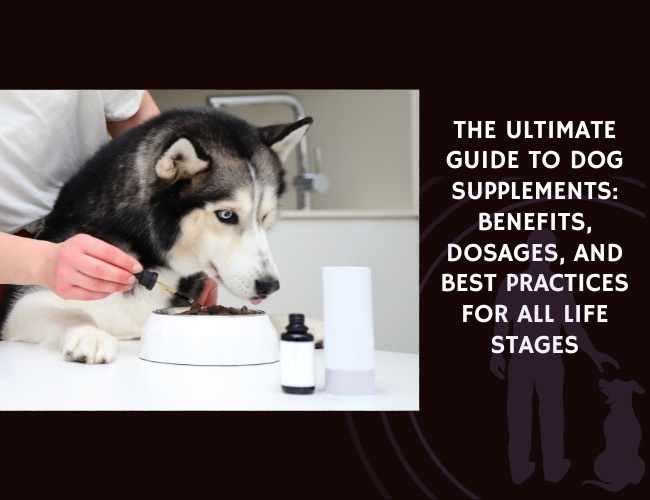Introduction to Dog Supplements
Understanding the Role of Dietary Supplements in Canine Health
Dietary supplements have become an essential component of canine health, aimed at enhancing and maintaining the well-being of dogs across various life stages. These supplements are often formulated with key ingredients that support normal body functions, from joint care to immune support. For instance, ingredients such as glucosamine and chondroitin play a significant role in joint health by promoting cartilage repair and reducing inflammation, which is particularly beneficial for dogs suffering from osteoarthritis (OA).
How Supplements Enhance Health Across Different Life Stages
One size does not fit all when it comes to canine supplements.
- Puppies: For puppies, the focus is on supporting growth and development. Supplements like DHA, which is essential for brain health and cognitive function, and calcium for bone development, are commonly recommended.
- Adult Dogs: Supplements here focus on maintenance and prevention. Many adult dogs benefit from joint supplements if they are active or belong to breeds prone to joint issues.
- Senior Dogs: Age brings along a variety of health issues. Senior dogs often benefit from supplements aimed at cognitive support, such as omega-3 fatty acids, and joint health to manage age-related decline.
Importance of Veterinary Consultation Before Starting Supplements
Before introducing any new supplement to your dog’s diet, it is crucial to consult with a veterinarian. Your vet can provide personalized recommendations based on your dog’s specific needs, weight, health status, and any pre-existing conditions. More importantly, they can guide you on the appropriate dosages and help monitor for any adverse effects or interactions with other medications your dog might be taking. This step ensures the safe and effective use of supplements, minimizing risks such as gastrointestinal upset or other potential side effects.
Dietary supplements can significantly contribute to your dog’s overall health and quality of life. From supporting growing puppies to aiding aging seniors, the right supplements can make a world of difference. However, always remember that a balanced diet and regular veterinary check-ups are irreplaceable for maintaining your furry friend’s health.
Types of Essential Supplements
Joint and Mobility Supplements
Maintaining healthy joints is crucial for your dog’s mobility and overall quality of life. Key joint and mobility supplements include:
- Glucosamine and Chondroitin: These ingredients support joint health by promoting cartilage repair and reducing inflammation. Studies have shown that they can help alleviate pain and improve mobility in dogs with osteoarthritis (OA) ([The Role of Dietary Supplements](The Role of Dietary Supplements in dogs.txt)).
- MSM (Methylsulfonylmethane): Known for its anti-inflammatory properties, MSM helps reduce pain and improve joint function. It plays a role in enhancing joint lubrication and promoting joint health ([The Role of Dietary Supplements](The Role of Dietary Supplements in dogs.txt)).
These ingredients work by providing the necessary building blocks for cartilage repair and reducing inflammation. The dosage recommendations for glucosamine typically range from 500 to 1500mg per day, while chondroitin is often given at 200 to 400mg ([The Role of Dietary Supplements](The Role of Dietary Supplements in dogs.txt)).
Skin and Coat Supplements
Healthy skin and a shiny coat are indicators of your dog’s overall well-being. Essential supplements for skin and coat health include:
- Omega-3 and Omega-6 Fatty Acids: These fatty acids are crucial for maintaining skin health and improving coat quality. They help maintain the skin barrier, reduce inflammation, and promote a healthy coat.
- Biotin: Biotin is essential for skin repair and health, aiding in the prevention of skin disorders. It supports the overall quality of the coat.
Researchers have found that omega fatty acids can significantly improve coat quality and reduce skin inflammation in dogs. The typical dosage for omega-3 fatty acids is 100-200mg per 10 pounds of body weight.
Digestive Health Supplements
A healthy digestive system is vital for your dog’s overall health. Digestive health supplements include:
- Probiotics and Prebiotics: These supplements support gut health by promoting a healthy microbiome. Probiotics enhance gut flora, while prebiotics provide food for beneficial bacteria.
- Digestive Enzymes: These enzymes help break down food and improve nutrient absorption, aiding in better digestion.

Evidence suggests that probiotics can alleviate gastrointestinal disorders and improve stool quality in dogs. Dosage recommendations for probiotics commonly range from 1 billion CFUs per day for small dogs to up to 5 billion CFUs for larger breeds.
By understanding the benefits and appropriate dosages of these essential supplements, dog owners can enhance their pets’ health and quality of life. Always consult with a veterinarian before starting any new supplement regimen to ensure your dog’s safety and well-being.
Age-Specific Supplementation Needs
Understanding age-specific supplementation needs for dogs is essential for ensuring their overall health and well-being.
Different life stages come with unique nutritional demands. Let’s explore how supplements can benefit puppies, adult dogs, and senior dogs.
Puppy Supplements for Growth and Development
Puppies are in a crucial phase of growth and development. Supplementing their diet can support brain health, immune function, and overall vitality. Key supplements for puppies include:
- DHA (Docosahexaenoic Acid): An omega-3 fatty acid crucial for brain and eye development. Ensuring puppies get enough DHA can enhance their cognitive function and vision health.
- Calcium and Phosphorus: Essential minerals for bone development. Adequate intake supports strong bones and teeth.
- Probiotics: These beneficial bacteria help in maintaining a healthy gut flora. Probiotics can enhance digestion and boost the immune system.
- Colostrum: The first milk produced by mammals, rich in antibodies, which helps bolster a puppy’s immune system during the early weeks of life.
Monitoring the dosage of these supplements is important. DHA is usually dosed at 100-200mg per day for puppies, while calcium and phosphorus requirements are higher during growth phases but should be administered according to veterinary guidance to avoid imbalances.
Adult Dog Supplements for Maintenance and Prevention
Adult dogs face different health challenges compared to puppies. Maintaining their health and preventing disease is the focus during this stage. Essential supplements for adult dogs include:
- Glucosamine and Chondroitin: These compounds support joint health by promoting cartilage repair and reducing inflammation. They are especially beneficial for active breeds or those predisposed to joint issues.
- Omega-3 and Omega-6 Fatty Acids: Important for maintaining skin health and coat quality. These fatty acids can reduce inflammation and enhance the skin’s barrier function.
- Probiotics and Prebiotics: Maintaining a healthy digestive system is crucial. Probiotics support gut health by introducing beneficial bacteria, while prebiotics serve as food for these bacteria.
Typical dosages for glucosamine range from 500-1500mg per day, while omega-3 fatty acids are dosed at approximately 100-200mg per 10lbs of body weight. Always consult a veterinarian to tailor the supplementation plan according to the dog’s specific needs.
Senior Dog Supplements for Age-Related Conditions
As dogs age, their nutritional needs change. Senior dogs often require supplements to manage age-related conditions and maintain quality of life. Essential supplements for senior dogs include:
- Antioxidants: Vitamins E and C help protect cells from oxidative damage, supporting immune function. Regular intake of antioxidants can help reduce the aging process.
- Omega-3 Fatty Acids: Important for cognitive function and reducing inflammation. DHA, a specific type of omega-3, is beneficial and typically dosed at 100-200mg per day.
- Coenzyme Q10 (CoQ10): This antioxidant supports cardiovascular health by improving heart function and reducing oxidative stress in heart tissues.
- Senior-Specific Probiotics: These are tailored to meet the digestive needs of older dogs, enhancing digestion and nutrient absorption.
Regularly monitoring and adjusting supplement regimens is crucial as senior dogs may experience different health issues. Consulting with a veterinarian ensures the safe and effective use of these supplements.
By understanding and addressing age-specific supplementation needs, dog owners can help ensure their pets lead healthy and happy lives. This continual adjustment and monitoring reflect an informed and compassionate approach to pet care, setting the stage for addressing more specific chronic conditions in the next discussion.

Dosage Guidelines and Administration
Understanding Proper Dosages Based on Weight and Condition
Administering the correct dosage of supplements to your dog is crucial to ensure their efficacy and safety. Dosages typically depend on your dog’s weight, age, and specific health condition. Here are some general guidelines:
- Glucosamine: Commonly used for joint and mobility support, glucosamine dosages usually range from 500mg to 1500mg per day, depending on your dog’s size. Dogs under 20lbs may need 500mg, while larger breeds might require up to 1500mg.
- Omega-3 Fatty Acids: For skin and coat health, omega-3 dosages often vary from 100mg to 200mg per 10 pounds of body weight.
- Probiotics: To support digestive health, smaller dogs may need around 1 billion CFUs (colony-forming units) per day, whereas larger breeds may require up to 5 billion CFUs.
Always consult with your veterinarian to tailor the dosage to your dog’s specific needs.
Best Practices for Supplement Administration
To maximize the benefits of supplements, follow these administration tips:
- Consistency is Key: Administer supplements daily at the same time to create a routine and ensure consistent blood levels of the supplement.
- With or Without Food: Some supplements absorb better with food, while others should be taken on an empty stomach. Omega-3 fatty acids, for instance, often have better absorption when given with meals.
- Monitor Responses: Keep a close eye on any changes in your dog’s health—positive or negative. Inform your vet if you notice any adverse reactions or if the supplement seems ineffective after a considerable period.
- Gradual Introduction: When introducing a new supplement, start with a lower dose and gradually increase to the optimal dose. This can help reduce the risk of gastrointestinal upset.
Risks of Over-Supplementation and Potential Side Effects
Over-supplementation can pose significant risks, including:
- Gastrointestinal Issues: Excessive intake of supplements like glucosamine can lead to diarrhea or vomiting.
- Nutrient Imbalance: Too much of certain vitamins or minerals can disrupt overall nutrient balance, leading to conditions like hypervitaminosis.
- Organ Stress: High doses of supplements can put undue stress on the liver and kidneys, potentially leading to long-term damage.
Transition to Next Topic
Understanding the proper dosage and administration techniques is essential for your dog’s health and well-being. In addition to correct dosages, it’s important to recognize that supplements can play a significant role in managing chronic conditions effectively.
Managing Chronic Conditions
Managing chronic conditions in dogs involves the careful administration of supplements tailored to address specific health issues such as arthritis, immune system support, and cardiovascular health.
Supplements for Arthritis and Joint Problems
Arthritis is common in senior dogs, but managing joint health is crucial at any life stage. Here are some essential supplements for joint health:
- Glucosamine and Chondroitin: These support joint health by promoting cartilage repair and reducing inflammation. Studies have shown that glucosamine can help alleviate pain and improve mobility in dogs with osteoarthritis (OA).
- MSM (Methylsulfonylmethane): Known for its anti-inflammatory properties, MSM can help reduce pain and improve joint function.
- Green-Lipped Mussel: Rich in omega-3 fatty acids, this supplement has been shown to reduce inflammation and improve joint health.
These supplements work by providing essential building blocks for cartilage repair, reducing inflammation, and improving joint lubrication, which together enhance mobility and reduce pain.
Supporting Immune System Health
A robust immune system is key to a dog’s overall health. Supplements that support the immune system include:
- Vitamin E and C: These antioxidants help support immune function and reduce oxidative stress.
- Beta-Glucans: Known for their immune-modulating properties, beta-glucans can enhance the dog’s natural defense mechanisms.
- Reishi Mushroom: This supplement is used for its potential to enhance immune responses.
These supplements help by enhancing the body’s natural defense mechanisms, reducing oxidative stress, and improving the dog’s ability to fight infections.
Cardiovascular Health Supplements
Maintaining cardiovascular health is crucial for dogs, especially those with heart conditions. Key supplements for heart health include:
- Taurine and L-Carnitine: These amino acids support heart function and energy metabolism.
- CoQ10: An antioxidant that supports heart health by reducing oxidative stress in heart tissues.
These cardiovascular supplements work by improving cardiac function, reducing oxidative stress, and supporting energy metabolism in heart cells.
Managing these chronic conditions through supplementation requires a comprehensive approach. It is essential to start with veterinary consultation and choose high-quality products that fit the dog’s specific needs. Regular monitoring and adjusting supplement regimens ensure the best outcomes.
Quality and Safety Considerations
Ensuring the quality and safety of dog supplements is paramount for their efficacy and your pet’s wellbeing. This section provides insights on choosing high-quality products, monitoring for adverse effects, and understanding the interactions with medications or other supplements.

Choosing High-Quality Supplement Products
When selecting supplements for your dog, opt for high-quality products to ensure effectiveness and safety. Here are some key factors to consider:
- Ingredients: Always check the label for active ingredients and their concentrations. Look for products with ingredients that have been scientifically proven to benefit canine health, such as glucosamine for joint support or omega-3 fatty acids for skin and coat health.
- Purity and Formulation: Ensure the supplement is free from harmful additives, fillers, and contaminants. Check if the product has been tested for purity and potency by third-party laboratories.
- Reputation: Choose supplements from reputable brands with positive reviews from customers and recommendations from veterinarians. Research the manufacturer’s reputation and certifications to ensure trustworthiness.
Monitoring for Adverse Effects
Once you start giving supplements to your dog, it’s crucial to keep an eye on their health. Here are some best practices:
- Observe Health Changes: Regularly monitor your dog’s behavior and health condition. Watch for any signs of improvement or adverse reactions, such as gastrointestinal issues, allergic reactions, or unusual behavior.
- Adjust Dosage as Needed: Based on the observed effects and veterinary advice, adjust the dosage or discontinue use if necessary. Periodic veterinary assessments are recommended to ensure the supplement continues to meet your dog’s needs.
- Documentation: Maintain a log of the supplements given, including the dosage and any changes in your dog’s health. This can be helpful for tracking progress and identifying patterns if adverse effects occur.
Interactions with Medications and Other Supplements
Supplements can interact with medications, altering their effectiveness and potentially causing harmful effects. Here are some considerations:
- Consult Your Veterinarian: Before starting any new supplement, consult your veterinarian to ensure it does not interact negatively with any medications your dog is currently taking. Your vet can provide guidance on safe combinations.
- Understand Potential Interactions: Some supplements can impact the absorption and effectiveness of certain medications. For example, calcium supplements can interfere with the absorption of certain antibiotics.
- Space Out Supplements: If your dog is taking multiple supplements, space them out throughout the day to reduce the risk of interactions. This can help prevent any potential negative effects from overlapping ingredients.
By prioritizing quality and safety, you can help ensure that the supplements you provide will support your dog’s health effectively and safely. Stay informed and proactive to maintain the best possible outcomes for your furry friend.
Moving forward, we’ll dive into emerging research and trends in the field of canine supplementation. Stay tuned to explore the future landscape of supplement solutions for dogs.
Future of Canine Supplementation
Emerging Research in Natural vs. Synthetic Supplements
The field of canine supplementation is witnessing rapid advancements, particularly in the comparison between natural and synthetic supplements. Recent studies emphasize the benefits of natural supplements derived from whole food sources, which tend to be more easily absorbed by the body. Natural supplements, like green-lipped mussel and reishi mushroom, are gaining popularity for their anti-inflammatory and immune-boosting properties, respectively.
Synthetic supplements, on the other hand, are chemically engineered to mimic the properties of natural nutrients. They are often more cost-effective and accessible. However, the long-term efficacy and safety of these synthetic options are topics of ongoing research. For instance, while synthetic glucosamine and chondroitin have shown benefits in joint health, the overall effectiveness compared to their natural counterparts remains under scrutiny.
Gaps in Current Supplement Research
Despite significant strides, there are still considerable gaps in canine supplement research that need to be addressed. Key areas requiring further investigation include:
- Long-term effects: Understanding the prolonged impact of supplement use on canine health is vital. Studies often focus on short-term benefits, but the effects of sustained supplementation over several years require deeper analysis.
- Interactions with medications: Supplements can interact with prescribed medications, leading to adverse effects. Comprehensive studies on these interactions can help in formulating safer supplementation guidelines.
- Efficacy comparison: More comparative studies between natural and synthetic supplements are needed. Such research can shed light on the relative benefits and risks, helping pet owners make informed decisions.
Trends in Holistic Supplementation Approaches
The holistic approach to canine supplementation is gaining traction, focusing on the overall health and well-being of dogs rather than targeting specific ailments. This approach often involves the use of multiple supplements that work synergistically to support various body systems.
- Anti-inflammatory diets: Incorporating supplements like omega-3 fatty acids and turmeric into a dog’s diet to reduce inflammation and promote overall health.
- Gut health: Probiotics and prebiotics are being widely recognized for their role in maintaining a healthy gut microbiome, which is essential for overall health.
- Cognitive support: Ingredients like DHA and phosphatidylserine are included in senior dogs’ diets to support brain health and slow cognitive decline.
Holistic supplementation emphasizes natural, whole-food-based products, aligning with the trend towards cleaner, more organic pet food and supplements. As the understanding of canine nutrition evolves, so too does the integration of these holistic approaches into everyday pet care routines.
By staying informed about the latest developments and ensuring a balanced and vigilant approach to supplementation, pet owners can significantly enhance the health and quality of life for their furry companions.










